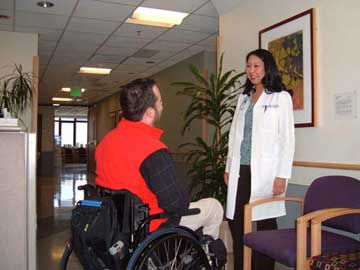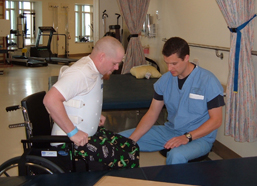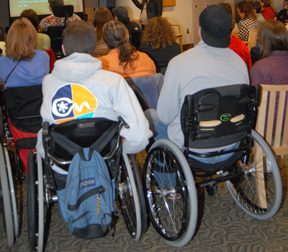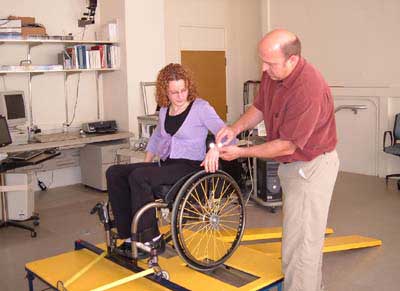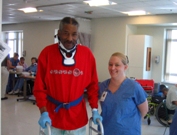SCI Forum Reports
From Injury to Employment: Work after SCI
January 11, 2005
Resources are listed at the end of this report.
SCI is a devastating event that often disrupts every aspect of life, including career goals and employment prospects. Returning to work after injury occurs for some but not all individuals with SCI and depends on many factors, such as injury level and severity, age, prior education and work experience, health issues and medical complications. Each person has a unique story.
Curt Johnson , a UWMC rehabilitation counselor, begins exploring possible work options with patients during their initial rehab inpatient stay. "I emphasize that work doesn't always have to be for financial reward," he told the forum group. Work also provides personal satisfaction, opportunities to socialize, structure, a reason to get up in the morning-"it's something that's productive and gives a person some self-worth." He often recommends that patients ease back into work by volunteering at first, because it is an excellent way to evaluate one's work readiness, endurance levels, and need for accommodations.
"For many people who don't go back to work for a long time, fear is a huge factor: fear of failure; fear of change; fear of losing medical coverage," Curt continued. When there is a financial disincentive to work-i.e., a person is financially better off not working and retaining disability benefits than working and losing those benefits-it's sometimes difficult to find a reason to go back to work when the effort and obstacles are so daunting. In these cases, "people have to look inside themselves and make a decision about what they really want to do with the rest of their lives," he said. Vocational counselors and resources can help.
The Washington State Division of Vocational Rehabilitation ( http://www1.dshs.wa.gov/dvr/index.htm ; 800-637-5627), a state and federal agency, helps people with disabilities prepare for and obtain work by providing services such as counseling and career goal development, job preparation skills, training, education, job placement, accommodations or assistive technology, and short-term medical support if necessary.
"DVR isn't for everybody, but they are a wonderful funding source," Curt said. "If you don't get along with your counselor, ask for another one. If you don't agree with the plan they put together for you, get in touch with the independent watchdog agency called CAP (Client Assistance Program)." CAP can be reached at 800-544-2121.
The services of rehabilitation counselors such as Curt at the UW Division of Rehabilitation Counseling (206-543-3677) are covered by private insurance and Medicaid with a physician's referral.
The Social Security Administration (SSA) provides social security disability income (SSDI) for people who were working before their injury. The SSA's work incentive program, called "Ticket to Work," is designed to allow people to work without risking loss of disability benefits. (The SSA Web site at http://www.ssa.gov has information about qualifying and applying for disability benefits, Ticket to Work, and more. The toll-free phone number is 800-772-1213.)
"Working with SSDI can be very confusing," Curt continued. It's a big, complex bureaucracy. A non-profit agency called Positive Solutions ( http://www.psbrc.org ) provides free counseling and assistance about disability benefits to persons living in King (206-322-8181) and Kitsap (360-405-0620) counties.
The Washington Assistive Technology Alliance (WATA) is a consumer advocacy program that provides information, referral, legal advocacy, and other services related to obtaining assistive technology equipment for work, home or school. Their Web site ( http://wata.org/ ) is comprehensive and extremely user-friendly. "It has a forum you can send questions to," Curt said, "and people from all over the country read this forum and respond." WATA also has an equipment exchange program for borrowing, buying or selling used AT equipment.
The Job Accommodation Network (JAN) is a federally funded, free consulting service designed to increase the employability of people with disabilities by providing solutions for worksite accommodation and other services (800-526-7234; http://www.jan.wvu.edu /).
After her injury at age 17, Tammy -one of the panelists* in this evening's forum-gave up her lifelong dream of one day becoming a nurse. "I felt it wasn't possible (with my injury)," she said. "I was just lost." She went on to college anyway, tried a couple of different majors, took some time off from her education, and four years ago found herself in Seattle, across the country from her home state of New Hampshire. Having volunteered as a public speaker for the Think First National Injury Prevention Program in New Hampshire and then Florida, she starting volunteering at the Seattle Think First chapter soon after arriving in town. "Two weeks later I was hired as their coordinator," she said. "It was absolutely wonderful."
But the local Think First office lost its funding last year and Tammy was laid off. She took a temporary position in rehabilitation outpatient services at UWMC-a job that soon became permanent. She also is finishing her college degree online through Empire State College, which allows her to work full time during the day.
DVR has provided Tammy key assistance along the way: paying for school, buying a new wheelchair and computer, helping with a car purchase, "anything I needed that would allow me to continue to work."
"The biggest thing for me returning to work was fear: can I work 40 hours a week? Are people going to treat me differently?" she remembered wondering. "Luckily, I've worked in places where I'm surrounded by people in a community of disabilities. When patients come in and see me in a chair they say 'hey, cool, you're in a chair!' And all of a sudden the relationship between me and the patient changes. It's a way for me to be a role model."
Tammy admits she never thought she'd get her life "to a point where I could be working full-time and going to school. Next I'm going on to get my master's degree. I finally figured out where I fit into this world. I don't know where life's going to take me, but with a little encouragement and support from resources that are out there, it's possible to do. Working has made a tremendous difference in my life. To be self-sufficient has been the best thing. It's not easy, but it's something you can do."
Until his T5 injury 30 years ago at age 17, Bill 's work experience had been limited to "flipping burgers at a Burger King. That was my skill set." His first attempt at college didn't go well, and he dropped out. But the reality of the marketplace quickly changed his perspective. "My first job was the most boring data-entry job. I lasted a week in it. But it taught me I really did want to go back to school."
He entered Evergreen State College in Olympia and loved it. He became interested in photography and decided, "I wanted to be a photographer, and the wheelchair wasn't going to keep me from doing it." After further training in advertising and commercial photography in LA, Bill spent the next ten years in both LA and NYC in that field.
"I quickly realized that kind of high-end photography was difficult from a chair," he recalled. "I found a lot of obstacles." He ended up working more as a production manager and enjoyed it. "But it's very cyclical in terms of finances," he said. "Some days you'd make a lot of money, some days you wouldn't make a cent. Plus, living in NYC in a chair is a challenge. Lots of fun, but lots of wear and tear."
He moved back to Seattle and started over. With his business experience, he landed a job at the UW as an entry level fiscal specialist. He took advantage of the UW's tuition exemption program to get his CPA and advance his career. He's been at the UW for 14 years and recognizes that work offers many rewards besides income, such as an expanding social network. Perhaps best of all, "I met my wife through work."
Working at the UW, both Bill and Tammy receive excellent health and dental benefits. This is often a key attraction in a job. Tammy turned down a previous job offer because she didn't like the health insurance choices. "Health benefits was a huge issue for me when I was looking for a job," she said.
Eight years ago, Billy was a freshman at the University of Washington when he fell out of a third floor window and sustained a C6 injury. After rehab he went back to school and eventually obtained a degree in mechanical engineering.
He heard about Seattle's ACCESS Job Fair for persons with disabilities and, after doing some job research, determined to go to the fair and apply for a job with the Federal Aviation Administration. "I brought my recommendations, resume, references, put on a suit and tie. I really wanted that job," he remembered. "Two months later I got hired. I work with air conditioning systems at radar sites and air traffic control towers. I also travel, which is a challenge but very rewarding."
At first he was worried about being seen as the "disability quota" person, he said. "I had to work to overcome that image." Now he feels he is seen as mechanical engineer foremost, rather than someone with a disability.
Todd is a high-level tetraplegic who uses a chin-control joystick. "I was injured 18 years ago at age eight, so my skill set was proficiency in legos, snack time, nap," he quipped. He decided to attend technical college in Edmonds, and after a few bumpy years of unsatisfactory experiences and dead-ends with DVR and SSDI, he landed a job at a medical software company on Bainbridge Island. He commutes by ferry.
"Now I'm director of operations at the firm," he said. "I love my job."
It has changed his life. Before this, "I never once felt needed during by disability. I felt like a leech on my mom, step dad, siblings, caregivers," he recalled. "Getting a job was a turning point. I felt needed. It gave me lots of validation and self-respect."
Todd has learned to be a self-advocate regarding accessibility issues. Attitude is important, he believes. "You need to be diplomatic and professional." He often has to research and find his own solutions to accessibility problems, such as getting the elevator automated and arranging for a hands free cell phone system (he has no hand function.) Working for a small company forces him to be a maverick but also allows him to be creative with his problem-solving. Todd receives no government insurance or disability benefits, so his "can-do" approach to life has been an essential ingredient in his success.
While Bill hasn't had accessibility problems at work-the UW has it's own ADA office-there are usually attitude barriers to surmount in any work place. "We have to do some overcoming of prejudices," he said. "We see that in all aspects of life."
All the panelists agreed that it's best to be proactive about explaining one's special health and physical needs with employers, before "accidents" or emergencies come up. "I mention things that may come up ahead of time," Tammy said. "For example, I may have an accident and need to go home to change my clothes." Although she doesn't enjoy sharing such private matters with an employer, she finds it helps things go smoothly. Tammy admitted that working in a rehabilitation setting has special benefits, including disability-aware co-workers and a work station set-up that accommodates her physical needs.
"If you're honest and positive up front, your co-workers are more comfortable," Todd agreed. "People are extremely fascinated by the weirdness of life and want to know how I get through it. They want to learn. It's an opportunity to educate people in a really cool way." Todd's quick wit and sense of humor also put people immediately at ease.
"You have to get comfortable with (your disability) yourself," Tammy agreed. "People want to know, they're curious. I get the 'why I'm in a wheelchair' story over with first thing so they can get to know me."
She wasn't always this confident. "I used to be really timid. In college, in the dorm, I did my bowel program in the middle of the night." Public speaking through Think First helped build her confidence.
Panelists had different approaches regarding what to tell potential employers about their disability. "I decided I wouldn't let them know before the interview about my disability," Tammy said. "I didn't want that barrier against me, so I said nothing in my resume or over the phone." After setting up the interview, she'd make an anonymous phone call and ask if the place was wheelchair accessible. Then she'd do a "test run"-drive there and check it out, plan where to park, what entrance to use, how long it would take, etc.
"I know employers have a lot of questions but aren't sure if they can ask," Bill said. "So I just work it into the conversation. You know they want to know."
Todd tells prospective employers ahead of time that he's in a wheelchair. "My disability is all over my resume," he said.
(For tips about interviewing, what employers can ask, etc., see "Job Interviews After a Spinal Cord Injury," online at http://www.worksupport.com/resources/viewContent.cfm/358.)
Reflecting on the challenges the newly injured face when thinking about going back to work, the panelists agreed that one's own attitude and fear was often the biggest challenge.
"It's hard, but you have to accept (your situation) and choose to live with it," Todd said. "It's a mental boundary."
Chris Garbaccio , coordinator of the UW's SCI Peer Mentoring Program, was 30 and on a solid career trajectory when he became paralyzed. "It took me a while before I started thinking about working. A lot had to do with accepting myself." Getting back into the world occurred gradually, in a series of little, daily decisions: realizing that if he really wanted that grocery item he'd have to ask a stranger to reach for it; or if he wanted to see that movie, he'd have to figure out parking, entrances, seating. Eventually he was deciding, "Okay, now I want to do something because I'm tired of sitting around watching TV and feeling worthless," he said, and proceeded to get started. "The mental thing is important."
"People go through stages," Tammy said. "Not everyone goes through every stage. I was go-go-go after my injury, then three years later—boom!—I got depressed. It hit me—this is my life!" Taking action-making some decisions about school and changes in her living situation-helped pull her out of her depression.
"Every individual is different," Curt said. "Some never do go back to work," for a variety of reasons.
Chris emphasized that enthusiasm for one's work makes a huge difference. "Passion is important to all people, whether they're in a wheelchair or not. I was in international logistics and shipping before my injury and decided I didn't want to do that anymore." Working in the peer support program has given him new energy. "I decided helping people with SCI was important to me."
* Panelists' last names have been omitted to protect privacy.
- Washington State Division of Vocational Rehabilitation helps people with disabilities to prepare for and obtain work ( http://www1.dshs.wa.gov/dvr/index.htm ; 800-637-5627).
- Social Security Administration (SSA) has information about qualifying and applying for disability benefits, Ticket to Work, and more (800-772-1213; http://www.ssa.gov /).
- Positive Solutions ( http://www.psbrc.org ) provides free disability benefits counseling and assistance to persons living in King (206-322-8181) and Kitsap (360-405-0620) counties.
- Washington Assistive Technology Alliance (WATA) is a consumer advocacy program that helps persons with disabilities obtain assistive technology equipment for work, home or school ( http://wata.org/ ; Spokane office: 800-214-8731; Seattle office: 800-841-8345).
- Job Accommodation Network (JAN) helps with worksite accommodation, and other services (800-526-7234; http://www.jan.wvu.edu /).
- "Job Interviews After a Spinal Cord Injury" ( http://www.worksupport.com/resources/viewContent.cfm/358) is a brochure published by the Virginia Commonwealth University Spinal Cord Injury System (804-828-0861).
- Rehabilitation (Vocational) Counseling Clinic, University of Washington Medical Center, 206-598-4830.
- ACCESS Job Fair is an annual conference and job fair that brings together individuals with disabilities and employers, and provides information and resources to job seekers. The ACCESS 2005 Job Fair will be held on November 1, 2005 at the Microsoft Conference Center in Redmond, WA. For more information, contact: ABLETOWORK@aol.com ; 425-673-1041; http://www.accessnw.org .

